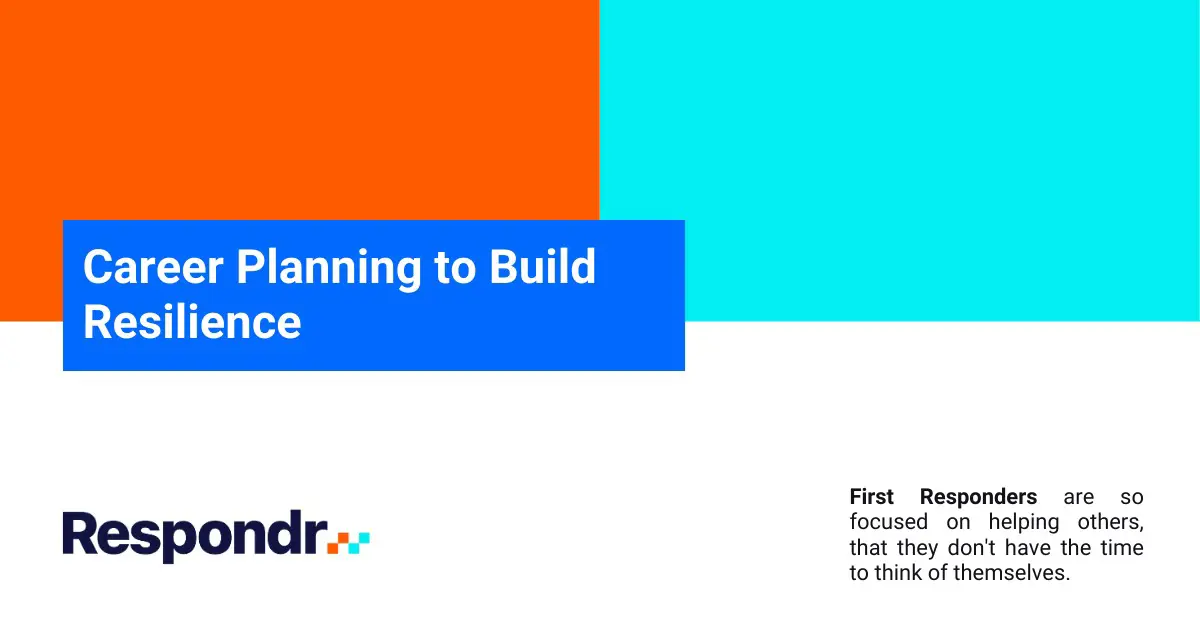
Career Planning to Build Resilience
Published by Respondr 5 min readCharting a Path of Resilience: Effective Career Planning in First Response
In the demanding and often unpredictable world of first response, resilience is not just a trait but a necessity. Career planning plays a pivotal role in building this resilience, empowering first responders to navigate their professional journeys with confidence and clarity. By setting clear career goals, engaging in continuous professional development and embracing personal growth opportunities, first responders can create a structured path that not only enhances their skill set and opens doors to new challenges but also fortifies their mental and emotional fortitude. This holistic approach to career planning is instrumental in developing the kind of resilience that is essential for the high-pressure environments that first responders encounter daily. Below are strategies that can help first responders build a resilient and satisfying career, ensuring they are well-equipped to handle both the challenges and opportunities that come their way.
1. Proactive Career Planning:
- Set Clear Career Goals: Define what success looks like for you, both in the short and long term. Consider different paths within first response, including specialized roles or leadership positions.
- Create a Roadmap: Once goals are set, develop a step-by-step plan on how to achieve them. This could include additional training, seeking mentorship or gaining experience in various roles.
- Regular Self-Assessment: Periodically assess your career progress and adjust your goals and plans as necessary. Be open to new opportunities and directions.
2. Continued Professional Development (CPD):
- Stay Informed: Keep abreast of the latest developments in first response. This includes new techniques, technologies and best practices.
- Expand Your Skills: Actively seek out CPD opportunities. This could be formal education, workshops, seminars or conferences. Online courses can also be a flexible option.
- Certifications and Specializations: Pursue additional certifications or specialize in areas like paramedic science, emergency management or critical care. Specializations can open doors to new roles and responsibilities.
3. Personal Development Opportunities:
- Develop Soft Skills: Skills like communication, leadership and emotional intelligence are crucial for advancement, especially in managerial roles. Consider courses or training to develop these.
- Engage in Networking: Build a professional network within and outside of your immediate field. Networking can provide insights into different career paths and opportunities.
- Seek Mentorship or Coaching: A mentor or coach who understands the nuances of first response can offer invaluable guidance and support in your career journey.
4. Work-Life Balance and Well-being:
- Prioritize Self-Care: Ensure you are taking care of your physical and mental health. A balanced life can improve job satisfaction and open your mind to new possibilities.
- Explore Passions Outside of Work: Engaging in hobbies or interests outside of work can provide a fresh perspective and sometimes even lead to unexpected career opportunities.
5. Leverage Your Experience:
- Consider Teaching or Training Roles: Your experience can be valuable in training or educating new first responders. Teaching can be a rewarding way to advance your career.
- Explore Administrative or Policy-Making Roles: Use your on-the-ground experience to contribute to policy-making, operational planning or administrative roles within emergency services.
6. Community Involvement:
- Volunteer or Participate in Community Programs: This not only increases your skill set but also enhances your understanding of the community you serve, which is invaluable in leadership roles.
Remember, a career as a first responder offers a multitude of pathways. It’s about staying proactive, continuously learning and being open to new experiences. The key to a satisfying career lies in not just advancing up the ladder, but also in personal growth and expanding your impact within the field.